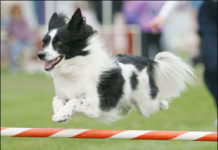Solutions for Reactive Dog Behavior
At some point in our lives, some of us find ourselves living with a difficult dog, one whose behavior challenges our patience, and exhausts our training knowledge – and opens our hearts and eyes to a new, better way of training. This is the story of one such dog and her very knowledgeable dog owner. Together, they reached an entirely new and higher level of dog training skills, thanks to the owner’s life-altering experiences with a reactive dog who wasn’t fit to compete in the career intended for her: Flyball. Flyball is not the sport for everyone. It is a relay team event, which means you have to commit to training and competing with your dog and other dogs and dog owners as a team, and you have to have an appreciation for over-the-top dogs and the resulting cacophony of sounds. In flyball, a team of four dogs race, one after the other, leaping a series of hurdles, throwing their bodies against a spring-loaded box that ejects a tennis ball, snatching the ball, and hurtling their bodies back down the row of jumps to where their next teammates strain to be released for their turns. The fastest team wins.
Calmative Herbs for Canine Panic Attack Occurrences
Dark clouds boil on the horizon, and a slow rumble of distant thunder delivers a slight vibration in the window panes. Jake, a large long-haired Chow-mix, is already nervous. He paces the living room, wild-eyed and panting, his body trembling with anticipation of the first dreaded clap of thunder. When it strikes, he tries to hide under the coffee table, and just like last time, he is too big to fit. The very same vase that was glued together after Fourth of July is reduced to a heap of jagged shards.
Help For a Dog With Car Phobia
Behavior issues, from simple good manners infractions to the more concerning problems of phobias and aggression, appear in dogs both large and small. But while training to modify behavior issues might look the same regardless of size, in other respects, the bigger the dog, the bigger the problem. When a Dachshund has a lapse in housetraining, the cleanup process is significantly easier than if an Irish Wolfhound has an accident. If a Havanese frantically jumps up on your elderly Aunt Tilly, the collateral damage is less than if a Great Dane does the same. And if a Yorkie is terrified of riding in the car and refuses to get in for an emergency trip to the vet, he can be picked up and placed inside – not so when a Newfoundland steadfastly refuses.
My Dog Is Not Eating
If your dog won’t eat, you have a small window of time to evaluate the situation, The better you know your dog, the easier it is to decide if it is something serious or just a phase.
Your Dog’s Pet Peeves
Eavesdrop on a group of dog owners discussing their dogs, and along with a lot of brags about newly trained behaviors and hard-won trophies and titles, you’re likely to hear a fair number of complaints about the annoying things their canine companions do. Well guess what? If you could eavesdrop on a pack of dogs at the dog park, you might well hear a litany of things that humans do to annoy their dogs!
Hannah’s Change of Heart
Hannah was a normal, healthy Labrador Retriever puppy: happy, boisterous, playful, and always willing to eat. Hannah’s owner, Connecticut resident Anne Hassett, bought Hannah when the pup was seven weeks old. Hassett trained, socialized, and loved the golden pup. A field-line Labrador, Hannah hunted on the weekends and enjoyed the comfy life of a companion Lab weekdays. Hannah was well known in hunting circles for her steady, easy-going temperament, the coveted hallmark of the Labrador breed. Hassett considered breeding her, and had the dog examined and tested for genetic diseases.
Why Dogs Sneeze When They Play
When a dog sneezes due to an irritation in her nose, the sneeze is forceful and may include nasal discharge. A social sneeze is small and delicate with no nasal discharge and very little head movement.
Dogs and Puppies Chew For a Number of Reasons, Learn to Properly Channel This...
between three and six months of age. While the baby teeth are shedding and the adult teeth are erupting
Train Your Dog to Accept Hugs
The process of teaching a dog to tolerate hugging involves either classical conditioning (giving a puppy a positive association with something she doesn't already have an opinion of), or classical counter-conditioning (giving a dog a new association with something she already has a negative opinion of). Either way, the process is similar, but it may go slower if you are working to change an existing opinion rather than simply installing one where none previously exists.
Postpartum Depression and Its Effect on the Dog
As a trainer and behavior consultant, I am always ready to provide all sorts of helpful information and internet links on the subject of bringing home a new baby to meet the dog. But I can honestly say that I never considered the emotional and hormonal component of the new mom and how it would affect her relationship with her pets.
Dealing With Submissive Urination
Submissive urination is a vexing challenge with some puppies and young dogs. Most grow out of it eventually, but in the meantime, how can you help your pup put a cork in it? In the canine world, when one dog wants to show deference to another, more dominant dog, he may urinate as a sign of submission. The more threatened he feels, the more likely he is to urinate. This is an involuntary reaction, an instinctive behavior that all dogs are born “knowing” how and when to exhibit. In a pack of dogs, this programmed behavior is a valuable survival mechanism. Puppies are extremely vulnerable to the wrath of adult dogs in the pack, and built-in submissive responses signal normal adult dogs to automatically shut off the aggression, thus keeping puppies from being hurt.
Behavior Medication Opens Doors
After about six weeks of living with Trill, Dr. Sharp knew that the frightened, anxious dog needed something more. The training and behavior protocols were working in the sense that the dog was cooperative, but Trill still had a panicked look in her eyes much of the time. Sharp was concerned: No animal should have to live with that much fear, she thought.

















